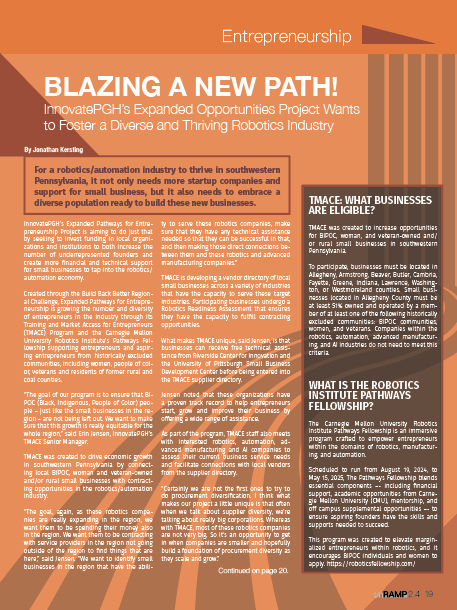Blazing New Pathways for Entrepreneurship
By Jonathan Kersting
 For a robotics/automation industry to thrive in southwestern Pennsylvania, it not only needs more startup companies and support for small business, but it also needs to embrace a diverse population ready to build these new businesses.
For a robotics/automation industry to thrive in southwestern Pennsylvania, it not only needs more startup companies and support for small business, but it also needs to embrace a diverse population ready to build these new businesses.
InnovatePGH’s Expanded Pathways for Entrepreneurship Project is aiming to do just that by seeking to invest funding in local organizations and institutions to both increase the number of underrepresented founders and create more financial and technical support for small businesses to tap into the robotics/automation economy.
Created through the Build Back Better Regional Challenge, Expanded Pathways for Entrepreneurship is growing the number and diversity of entrepreneurs in the industry through its Training and Market Access for Entrepreneurs (TMACE) Program and the Carnegie Mellon University Robotics Institute’s Pathways Fellowship supporting entrepreneurs and aspiring entrepreneurs from historically excluded communities, including women, people of color, veterans and residents of former rural and coal counties.
“The goal of our program is to ensure that BIPOC (Black, Indigenous, People of Color) people – just like the small businesses in the region – are not being left out. We want to make sure that this growth is really equitable for the whole region,” said Erin Jensen, InnovatePGH’s TMACE Senior Manager.
TMACE was created to drive economic growth in southwestern Pennsylvania by connecting local BIPOC, woman and veteran-owned and/or rural small businesses with contracting opportunities in the robotics/automation
industry.
“The goal, again, as these robotics companies are really expanding in the region, we want them to be spending their money also in the region. We want them to be contracting with service providers in the region not going outside of the region to find things that are here,” said Jensen. “We want to identify small businesses in the region that have the ability to serve these robotics companies, make sure that they have any technical assistance needed so that they can be successful in that, and then making those direct connections between them and these robotics and advanced manufacturing companies.”
TMACE is developing a vendor directory of local small businesses across a variety of industries that have the capacity to serve these target industries. Participating businesses undergo a Robotics Readiness Assessment that ensures they have the capacity to fulfill contracting
opportunities.
What makes TMACE unique, said Jensen, is that businesses can receive free technical assistance from Riverside Center for Innovation and the University of Pittsburgh Small Business Development Center before being entered into the TMACE supplier directory.
Jensen noted that these organizations have a proven track record to help entrepreneurs start, grow and improve their business by
offering a wide range of assistance.
As part of the program, TMACE staff also meets with interested robotics, automation, advanced manufacturing and AI companies to assess their current business service needs and facilitate connections with local vendors from the supplier directory.
“Certainly we are not the first ones to try to do procurement diversification. I think what makes our project a little unique is that often when we talk about supplier diversity, we're talking about really big corporations. Whereas with TMACE, most of these robotics companies are not very big. So it's an opportunity to get in when companies are smaller and hopefully build a foundation of procurement diversity as they scale and grow.”
To spur startup creation and entrepreneurship, the Carnegie Mellon University (CMU) Robotics Institute Pathways Fellowship is an immersive program crafted to empower entrepreneurs within the domains of robotics, manufacturing and automation.
Corey Turner, Director of the Pathways Fellowship, explained that it blends essential components, including financial support, academic opportunities from CMU, mentorship and off campus supplemental opportunities to ensure aspiring founders have the skills and supports needed to succeed.
The nine-month-long cohorts are guided through a journey to learn, build and thrive with unprecedented access to the faculty and resources of the world-renowned Robotics Institute and the Swartz Center for Entrepreneurship at the Tepper School of Business.
Tuner said fellows benefit from a supportive ecosystem with tailored extra-curricular programming to explore their robotic and entrepreneurial interests. In year one of the Fellowship, additive programming was provided by the Equity | Impact Center and Women In Tech PGH (WITPGH).
“You know, the fellows are not all from robotics backgrounds,” said Turner. “It's also interesting to see the way people use robotics to improve their own industries, and really shows that robotics can advance our society in ways that we haven't even begun to think about.”
TMACE: WHAT BUSINESSES ARE ELIGIBLE?
TMACE was created to increase opportunities for BIPOC, woman, and veteran-owned and/or rural small businesses in southwestern
Pennsylvania.
To participate, businesses must be located in Allegheny, Armstrong, Beaver, Butler, Cambria, Fayette, Greene, Indiana, Lawrence, Washington, or Westmoreland counties. Small businesses located in Allegheny County must be at least 51% owned and operated by a member of at least one of the following historically excluded communities: BIPOC communities, women, and veterans. Companies within the robotics, automation, advanced manufacturing, and AI industries do not need to meet this criteria. Learn more here.
What is the Robotics Institute Pathways Fellowship?
The Carnegie Mellon University Robotics Institute Pathways Fellowship is an immersive program crafted to empower entrepreneurs within the domains of robotics, manufacturing, and automation.
Scheduled to run from August 19, 2024, to May 15, 2025, The Pathways Fellowship blends essential components –- including financial support, academic opportunities from Carnegie Mellon University (CMU), mentorship, and off campus supplemental opportunities –- to ensure aspiring founders have the skills and supports needed to succeed.
This program was created to elevate marginalized entrepreneurs within robotics, and it encourages BIPOC individuals and women to apply. Learn more here.